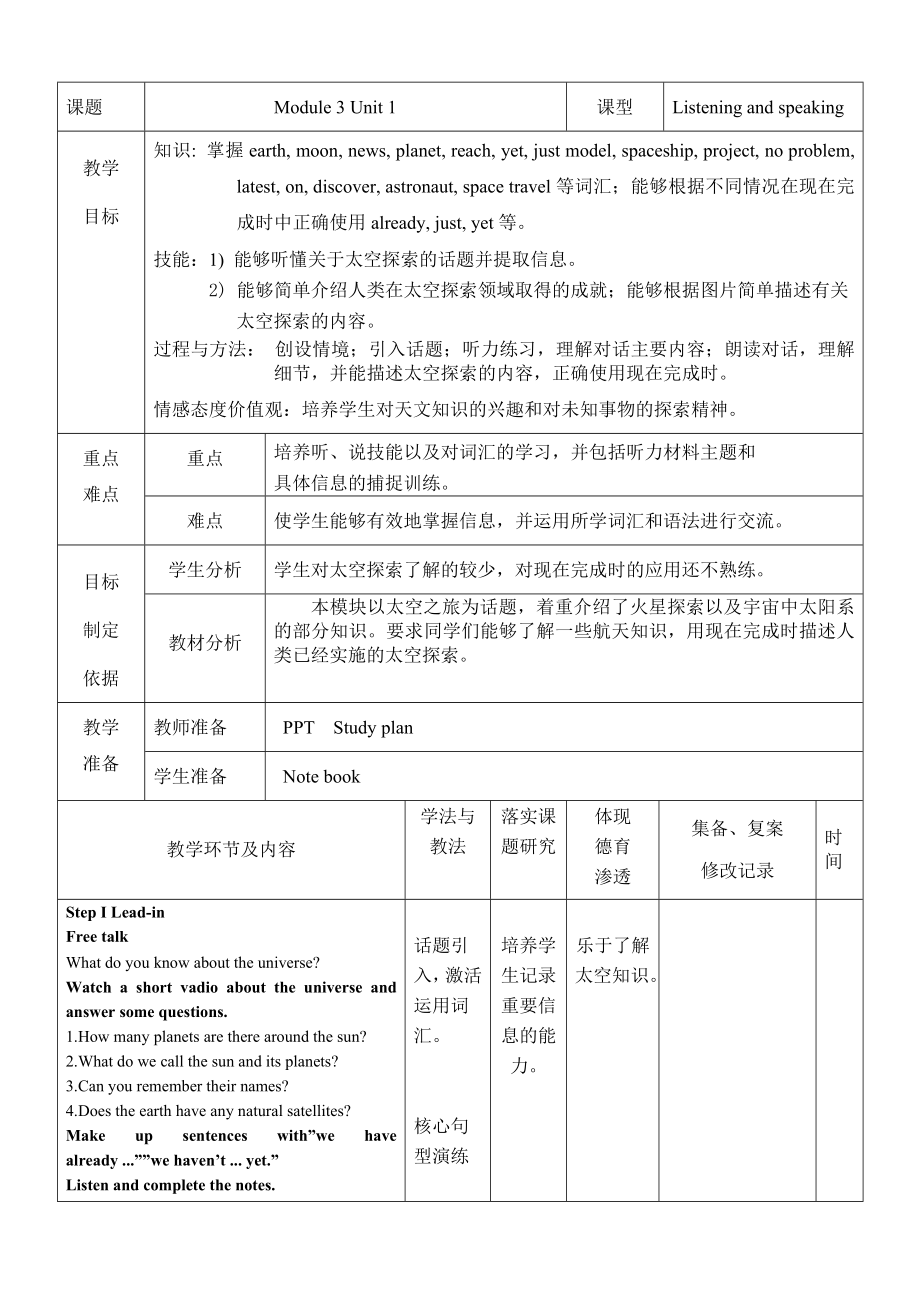《外研版英語(yǔ)八 年級(jí)下冊(cè)Module 3 Making plansUnit 1表格式教案》由會(huì)員分享,可在線閱讀��,更多相關(guān)《外研版英語(yǔ)八 年級(jí)下冊(cè)Module 3 Making plansUnit 1表格式教案(2頁(yè)珍藏版)》請(qǐng)?jiān)谘b配圖網(wǎng)上搜索��。
1�、
課題
Module 3 Unit 1
課型
Listening and speaking
教學(xué)
目標(biāo)
知識(shí): 掌握earth, moon, news, planet, reach, yet, just model, spaceship, project, no problem, latest, on, discover, astronaut, space travel等詞匯;能夠根據(jù)不同情況在現(xiàn)在完成時(shí)中正確使用already, just, yet等��。
技能:1) 能夠聽(tīng)懂關(guān)于太空探索的話題并提取信息��。
2) 能夠簡(jiǎn)單介紹人類在太空探索領(lǐng)域取得的成就�����;能夠根據(jù)
2�、圖片簡(jiǎn)單描述有關(guān)
太空探索的內(nèi)容。
過(guò)程與方法: 創(chuàng)設(shè)情境�����;引入話題�����;聽(tīng)力練習(xí),理解對(duì)話主要內(nèi)容�����;朗讀對(duì)話���,理解細(xì)節(jié)����,并能描述太空探索的內(nèi)容�����,正確使用現(xiàn)在完成時(shí)��。
情感態(tài)度價(jià)值觀:培養(yǎng)學(xué)生對(duì)天文知識(shí)的興趣和對(duì)未知事物的探索精神�。
重點(diǎn)
難點(diǎn)
重點(diǎn)
培養(yǎng)聽(tīng)���、說(shuō)技能以及對(duì)詞匯的學(xué)習(xí)�����,并包括聽(tīng)力材料主題和
具體信息的捕捉訓(xùn)練�����。
難點(diǎn)
使學(xué)生能夠有效地掌握信息���,并運(yùn)用所學(xué)詞匯和語(yǔ)法進(jìn)行交流�。
目標(biāo)
制定
依據(jù)
學(xué)生分析
學(xué)生對(duì)太空探索了解的較少��,對(duì)現(xiàn)在完成時(shí)的應(yīng)用還不熟練�。
教材分析
本模塊以太空之旅為話題,著重介紹了火星探索以及宇宙中太陽(yáng)系的部分知識(shí)�。要求同學(xué)們能夠
3、了解一些航天知識(shí)����,用現(xiàn)在完成時(shí)描述人類已經(jīng)實(shí)施的太空探索。
教學(xué)
準(zhǔn)備
教師準(zhǔn)備
PPT Study plan
學(xué)生準(zhǔn)備
Note book
教學(xué)環(huán)節(jié)及內(nèi)容
學(xué)法與
教法
落實(shí)課題研究
體現(xiàn)
德育
滲透
集備�����、復(fù)案
修改記錄
時(shí)間
Step I Lead-in
Free talk
What do you know about the universe?
Watch a short vadio about the universe and answer some questions.
1. How many planets are there ar
4���、ound the sun?
2. What do we call the sun and its planets?
3. Can you remember their names?
4.Does the earth have any natural satellites?
Make up sentences with”we have already ...””we haven’t ... yet.”
Listen and complete the notes.
Step II Listen and read
1. Listen and check the true senten
5����、ces.
1). Tony has just made a model spaceship for their school project but Daming hasn’t started yet.
2). Scientists has sent a spaceship to Mars.
3). The spaceship hasn’t arrived yet.
4). There are some astronauts in the spaceship.
5). Astronauts have already been to the moon.
2. Listen agai
6、n and complete the sentences.Ask students to write answers on the blackboard.
Scientists __________ a spaceship to Mars.
The journey ___________ several months.
It __________ in Mars already.
They _______________ life on Mars.
Astronauts ________ already ________ to the moon.
3. Listen and re
7���、ad after the tape
4. Read the conversation in roles,Pay attention to imitating the pronunciation and intonation.
5. Answer some more questions
Step III Find out sentences with”we have already ...””we haven’t ... yet.”
話題引入����,激活運(yùn)用詞匯�����。
核心句型演練
聽(tīng)力訓(xùn)練及指導(dǎo)�����。
重要知識(shí)點(diǎn)呈現(xiàn)及鞏固���。
朗讀
理解
8、
總結(jié)完成時(shí)態(tài)句子并掌握
培養(yǎng)學(xué)生記錄重要信息的能力�����。
理解對(duì)話主要內(nèi)容及細(xì)節(jié)��,并熟練掌握。
通過(guò)不同形式的訓(xùn)練��,激發(fā)學(xué)生的學(xué)習(xí)積極性�,培養(yǎng)英語(yǔ)學(xué)習(xí)的興趣。
樂(lè)于了解太空知識(shí)�。
努力學(xué)習(xí),為國(guó)家發(fā)展做出貢獻(xiàn)�����。
作業(yè)布置
必做: M3U1導(dǎo)航�����。背誦重點(diǎn)句式�。
選做:閱讀兩篇
板書(shū)設(shè)計(jì)
I haven’t started yet. Has it arrived yet?
It has arrived already. Astronauts have already been to the moon.
圍繞本課達(dá)成目標(biāo)、教學(xué)方式��、學(xué)習(xí)方式�、課程資源的開(kāi)發(fā)與利用,課堂設(shè)計(jì)理念實(shí)際教學(xué)效果……進(jìn)行反思
 外研版英語(yǔ)八 年級(jí)下冊(cè)Module 3 Making plansUnit 1表格式教案
外研版英語(yǔ)八 年級(jí)下冊(cè)Module 3 Making plansUnit 1表格式教案

